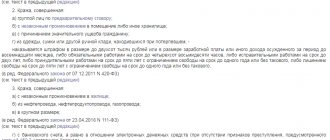Major thefts at work occur infrequently, but minor thefts occur regularly. Metal, tools, and spare parts are especially often stolen. In this case, the employer has the right to recover damages from the employee in full.
However, it is not uncommon for citizens to be wrongfully accused of theft. The company may not conduct an internal investigation, but simply assign someone to blame. This is a serious charge and in some cases may result in criminal liability. Therefore, it is necessary to know what to do if you are accused of theft. Our specialists are ready to help an employer bring a thief to justice, and a citizen to prove his innocence in case of wrongful accusations.
General provisions
False accusations of theft are common practice. A person may be accused of stealing goods from a supermarket, taking some of the products from the place of work, etc. Managers often hide unplanned expenses by accusing subordinates of stealing goods. Colleagues, acquaintances and even friends can act as accusers.
Having caught a person stealing, any citizen can contact the police with a complaint. Upon receipt of the request, a check is initiated. If the suspicions are confirmed, the alleged thief is accused of theft under Article 158 of the Criminal Code of the Russian Federation. If there is insufficient evidence, the initiation of a criminal case will be refused.
In addition, the applicant may be held liable for libel. By providing knowingly false information about another person, he will be punished under Article 128.1 of the Criminal Code of the Russian Federation. Therefore, accusations of theft without evidence can lead to very sad consequences.
It is possible to falsify a theft charge in a number of cases. For example, a citizen found a phone in a subway passage. He tried to turn it on to call the owner, but failed. Then the man took the phone so that no one would steal it. An eyewitness to the incident regarded the citizen’s actions as theft and contacted the police. Now the man will have to prove that he did not steal the phone, but found it and tried to return it to the owner.
If the accused is confident of his innocence, then he should not panic. A charge of theft is not a sentence, and therefore you need to prepare a good evidence base.
Emotions and behavior after theft
First, let's talk about what emotions are inherent in a thief and how to recognize him by his behavior.
- Suppressed aggressiveness. Adults are well aware that they are harming others, but they enjoy it. Probably, a person could not protect himself even in childhood, accumulated anger towards those around him, but even in adult life he was not able to fully realize himself, often becoming an energy vampire. Think about which of your colleagues falls into this category of thieves. Maybe there is a person who wanted to annoy you specifically: out of envy, jealousy, old grievances?
IMPORTANT! By depriving you of money or other items, the thief asserts himself and his self-esteem increases for a while.
- People do not always steal out of poverty and need. You will be surprised, but thefts are often committed by quite prosperous citizens with good jobs and stable incomes. They are driven by a thirst for hoarding, greed, and fear of missing out on any valuable thing. This is a rather complex psychological phenomenon. Psychologists believe that this is how our natural instincts, hidden deep in the subconscious, manifest themselves. When the concept of private property did not yet exist, people sought to replenish their supplies in order to survive. But, of course, such an explanation does not justify the thief.
Now - about your feelings. What if you were robbed? You will likely feel depressed and confused.
- Any theft is an invasion of personal space. This is why victims receive severe emotional trauma, even if the amount stolen turned out to be ridiculous. A child has difficulty parting with his favorite toy: an adult experiences approximately the same thing.
BY THE WAY! Money and things are memories, touches, work. Of course, you are upset to lose all this.
- You may feel confused because you have lost control of the situation. The feeling of helplessness is a serious stress, and the more significant the theft, the harder it is to survive. Some people are forced to turn to a specialist for psychological support. Some experts even compare theft to rape - in the sense that a person is forced to rebuild his “integrity.”
- Get rid of obsessive thoughts like “I could have prevented this if I had been more careful.” There are certain circumstances that are practically beyond our control. Try to accept this fact calmly and focus on other problems: for example, finding a thief in a team.
What rights does someone accused of theft have?
A citizen accused of theft has the following rights:
- In accordance with Article 51 of the Constitution of the Russian Federation, Russian citizens have the right not to testify against themselves and their loved ones. Therefore, being confident that the accusations are false, a person may not give any testimony until he meets with a lawyer.
- If the accused does not have the means to pay for a defense lawyer, he can count on the provision of a free lawyer.
- Until a person's guilt is proven, the presumption of innocence applies to him. Thus, a citizen cannot be held accountable until sufficient evidence has been collected to prove involvement in the crime.
- If the interests of the accused have been infringed, he can appeal to a law enforcement or supervisory authority. This is stated in Article 152 of the Civil Code of the Russian Federation.
Corpus delicti
Upon receiving a report of a crime, law enforcement officials are required to conduct appropriate checks. If during the preliminary investigation a crime is established, the investigator initiates a criminal case. In the absence of evidence, the applicant is refused to initiate a criminal case. If a citizen considers the refusal illegal, he has the right to contact the prosecutor's office.
According to the law, the prosecutor does not have the right to initiate criminal cases. However, he can send a corresponding request to law enforcement officers, demanding additional checks.
The injured party can go to court as part of a private prosecution, bypassing law enforcement agencies. To do this, the plaintiff needs to prepare a good evidence base. Otherwise, the claim will be rejected.
The corpus delicti is based on four elements:
- Subject of the crime. This is a citizen who has committed a criminal act. A legally capable person who has reached the age of 14 can be held accountable for theft.
- Object of crime. This is a public institution against which an unlawful act has been committed. In this case, the right of ownership, enshrined in Article 209 of the Civil Code of the Russian Federation, was violated.
- The subjective side is expressed in the attitude of the attacker to the committed criminal act. In the case of theft, the direct intent of the criminal who stole the item with selfish motives is required.
- Objective side. We are talking about a method of committing a crime, which can be confirmed by evidence and testimony of witnesses.
We can only talk about a crime if all four signs are present. The absence of at least one of them does not allow to initiate a criminal case.
Have a question for a lawyer? Ask now, call and get a free consultation from leading lawyers in your city. We will answer your questions quickly and try to help with your specific case.
Telephone in Moscow and the Moscow region: +7
Phone in St. Petersburg and Leningrad region: +7
Free hotline throughout Russia: 8 (800) 301-39-20
Theft involves the secret theft of property. A crime receives this status in the following cases:
- the item was stolen in front of the owner, but he did not notice it;
- the theft occurred in front of several eyewitnesses who did not understand that a crime was being committed;
- the witnesses were incompetent citizens who cannot objectively perceive reality;
- the theft occurred while the owner of the property was absent;
- the object was stolen in the presence of competent witnesses, but they did not try to prevent the crime.
What to do if you are accused of theft
The behavior of the accused depends on the circumstances. Below we will look at the two most common situations when a citizen can be accused of theft.
In the shop
If a store security guard suspects a shopper of theft, he may ask him to show the contents of the package. However, such actions are considered illegal, because the inspection procedure must be carried out in accordance with established rules. Only a police officer in the presence of two witnesses can check the packages.
Therefore, the actions of a citizen should be as follows:
- You should ask the security guard why he wants to see the contents of the packages. If there are no grounds, the requirement can simply be ignored. The security guard's personal interest is not considered a valid reason for the search.
- If the security representative has voiced a good reason, you must notify him that only police officers can conduct the search.
- We are waiting for the police to arrive. The search is carried out in the presence of two witnesses. Based on the results of the procedure, a corresponding act is drawn up.
If the search was carried out with violations, the victim has the right to demand compensation for moral damage. To do this you need to go to court.
Accusation by filing a police report
If a citizen wants to bring an attacker to justice for theft, he should contact law enforcement agencies. But in this case, you should remember the responsibility for providing false information. Having learned that charges of theft of property have been brought against him, a citizen has the right to contact the police with a statement of libel.
Based on received materials, law enforcement officers initiate investigative measures. Usually the investigation lasts no more than 10 days.
How to prevent theft?
- Select honest employees. There are usually very few of them in the team, but they exist. Ask them to talk about the nuances of working in a team that are not available to you (especially if you are a manager). This will help you more clearly see the psychological portraits of your colleagues and the work environment.
- Collect information bit by bit. This is one case where informants can be useful. Let them report the slightest suspicions and strange coincidences that will help identify the thief in the team.
ADVICE! Do not rush to make hasty decisions and pass judgment: people can make mistakes, so carefully compare the facts and draw your own conclusions.
- Place cameras at your workplace in advance. Normal practice in the interests of employees. In addition, such a measure will increase the safety of being in the office and will allow you to avoid conflicts with colleagues due to absurd suspicions.
We offer a funny video about the most brazen types of theft:
Unfortunately, theft in the workplace is not uncommon in our country. Employees steal from each other, steal goods, steal everything that is bad. Try to resist this sad trend and start with yourself - do not take what belongs to others, punish thieves who take advantage of the gullibility of their colleagues. Justice is on your side.
Responsibility
If the theft is proven in court, the citizen will bear administrative or criminal liability. It all depends on the amount of damage.
If less than 2,500 rubles were stolen, then liability arises under Article 7.27 of the Code of Administrative Offences. The following types of punishment are possible:
- an administrative fine of up to five times the value of the stolen property (at least 3,000 rubles);
- administrative arrest for a period of 10-15 days;
- up to 120 hours of compulsory work.
If larger sums are stolen, the attacker will be punished under Article 158 of the Criminal Code of the Russian Federation. The following preventive measures are provided for such crimes:
- a fine of up to 80 thousand rubles or in the amount of the convicted person’s six-month income;
- up to 360 hours of compulsory work;
- correctional labor for up to a year;
- up to two years of restriction of freedom;
- arrest up to four months;
- up to two years of forced labor;
- imprisonment for up to two years.
If the fact of theft is not confirmed, then the accused can bring the citizen who slandered him to justice under Article 128.1 of the Criminal Code of the Russian Federation. The following types of penalties are provided for libel:
- fine up to 500 thousand rubles;
- a fine in the amount of the convicted person’s salary for a period of up to six months;
- up to 160 hours of compulsory work.
Therefore, before pressing charges of theft, you need to gather strong evidence of the crime. Otherwise, the accuser may be held liable for libel.
Can you be jailed for theft at work?
Responsibility for theft at work may arise under Art. 158 of the Criminal Code of the Russian Federation or under other articles involving crimes against property. It doesn’t matter whether a person committed theft at work, in transport, or at a neighbor’s house, this can be classified as a criminal offense.
Only law enforcement agencies can initiate a case based on a statement from the employer. Only a court can impose criminal liability. To do this, you need strong evidence that the theft was committed in an amount of more than 2,500 rubles and, possibly, aggravating circumstances were present. Let us consider in more detail the terms of imprisonment provided for in various parts of Art. 158 of the Criminal Code of the Russian Federation.
- Part 1 Art. 158 of the Criminal Code of the Russian Federation, theft without aggravating circumstances. The maximum term of imprisonment is 2 years;
- Part 2 Art. 158 of the Criminal Code of the Russian Federation, theft by a group by prior conspiracy, with penetration into non-residential premises, with significant damage to the victim, from things that were with the victim. The maximum term of imprisonment is 5 years;
- Part 3 Art. 158 of the Criminal Code of the Russian Federation, theft on a large scale, with penetration into a residential premises, from oil pipelines, gas pipelines, and other pipelines. The maximum term of imprisonment is 6 years;
- Part 4 Art. 158 of the Criminal Code of the Russian Federation, theft on an especially large scale or committed by a group of persons. The maximum term of imprisonment is 10 years.
Also, these sanctions may be supplemented by fines or restriction of freedom after the completion of the sentence in a colony.










